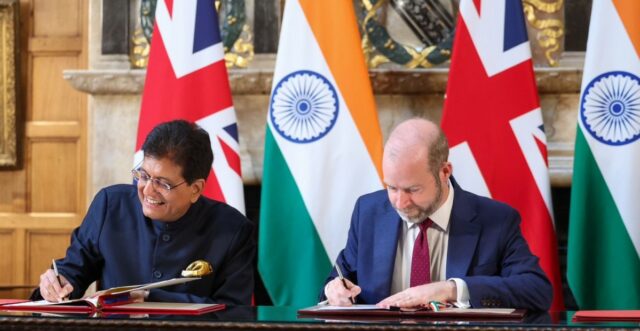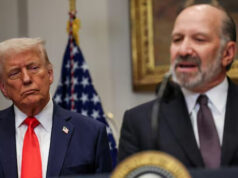
India and the United Kingdom have signed a Free Trade Agreement (FTA), also known as the Comprehensive Economic and Trade Agreement (CETA). The signing ceremony, attended by Prime Minister Narendra Modi and UK Prime Minister Keir Starmer in London, capped over two years of negotiations and is the most ambitious trade pact either country has signed in recent times. With this agreement, India and the UK aim to double bilateral trade to $120 billion by 2030.
The agreement promises to eliminate tariffs on 99 per cent of Indian exports to the UK. Besides, it will significantly reduce duties on UK exports entering India. This shift is expected to substantially benefit businesses and consumers on both sides. For India, it opens up access to one of the world’s most valuable and consumer-driven economies. For the UK, it creates a competitive foothold in one of the fastest-growing markets, at a time London is actively forging post-Brexit economic alliances.
Gains For India
India stands to gain from the immediate removal or phased reduction of tariffs across key sectors, particularly labour-intensive industries. Textiles, garments, seafood, gems and jewellery, leather and engineering products will enter the UK at zero or sharply reduced duties, enhancing their competitiveness. The textiles and apparel industry, for example, which has long faced tariff disadvantages compared to Bangladesh and Cambodia, will now benefit from a level playing field. Similarly, Indian seafood exporters, particularly those dealing in shrimp and white fish, will now have duty-free access to the UK market valued at over $5 billion. That will directly support coastal economies in states like Kerala, Andhra Pradesh and Odisha.
Agricultural exporters are expected to benefit from unprecedented access to the UK’s high-value food and beverage market. Products like basmati rice, mangoes, spices, fresh produce and processed foods will now enter the UK with zero tariffs, enabling Indian farmers and agri-businesses to fetch premium prices. These gains are not just about expanding export volumes but also about encouraging value-added production and packaging tailored to international markets. States such as Maharashtra, Punjab, Gujarat and the Northeast stand to see enhanced returns for their local crops and horticulture products.
Perhaps one of the most anticipated aspects of the agreement is the boost it provides for Indian professionals seeking to work in the UK. The deal includes provisions that ease mobility for a wide range of workers—from software engineers and yoga instructors to chefs and teachers. Under the agreement, business visitors, intra-company transferees and independent professionals will find it easier to obtain work permissions and bring their families, who will also have the right to work. These mobility provisions have been hailed as a breakthrough, especially for India’s services sector, which accounts for a significant portion of its export economy.
The CETA also opens new avenues for India’s digital, IT and software services. Indian firms will receive national treatment in sectors such as telecom, construction and environmental services in the UK, and benefit from stronger protections for cross-border data flows and digitally delivered services. This development is particularly important as Indian software exports to the UK—already valued at over $30 billion—are projected to grow at double-digit rates in the coming years.
Gains Tor The UK
For the UK, the agreement provides a gateway into India’s rapidly expanding consumer market. High-end products such as Scotch whisky, British gin, premium automobiles and medical devices will see significant tariff reductions in India, with some duties falling from over 100 per cent to 10 percent over a phased timeline. This could prove particularly advantageous for British manufacturers like Jaguar Land Rover (JLR), which already has a strong brand presence in India. British firms will also gain access to India’s government procurement market and benefit from new investment protections.
The agreement is expected to deliver transformative results for micro, small and medium enterprises (MSMEs) in both countries. In India, MSMEs dominate exports in sectors like leather, textiles and handicrafts. The removal of tariffs will improve their margins and help them compete more effectively against manufacturers from countries that already enjoy free trade access to the UK. The deal also includes provisions for cooperation in trade finance, business matchmaking and regulatory transparency, helping smaller businesses scale operations internationally.
Future-Proofing Trade
One of the standout features of the agreement is its commitment to future-proofing trade. Provisions on standards, digital trade, e-commerce and mutual recognition of professional qualifications ensure that the partnership adapts to emerging business realities. In the pharmaceutical sector, where India is a global leader in generic drugs, the CETA secures zero-duty access for Indian exports while facilitating regulatory collaboration on clinical trials and manufacturing practices. This not only benefits the Indian pharmaceutical industry but also aligns with the UK’s post-pandemic focus on affordable, high-quality healthcare products.
Equally important are the implications for India’s chemicals, plastics, engineering goods and electronics sectors. In each of these areas, India currently supplies only a small share of the UK’s large import demand. For instance, India exports just over $4 billion worth of engineering goods to the UK, while the UK imports nearly $200 billion globally. The CETA is expected to double Indian engineering exports to the UK within five years by removing duties as high as 18 per cent and streamlining customs procedures.
While the agreement has been signed, it is not yet in force. It must still be ratified by both sides—by Parliament in the UK and by the Union Cabinet in India. This process may take up to a year. However, once implemented, the CETA will become a cornerstone of the India–UK economic relationship, providing stability, predictability and a legal framework to foster long-term growth.
Geopolitical Alignment
Beyond the immediate economic benefits, the agreement signals a shift in geopolitical alignment. It demonstrates India’s rising clout as a trade partner of choice and reflects the UK’s strategic pivot toward the Indo-Pacific. It also serves as a blueprint for how future trade agreements can blend market access with worker mobility, innovation and sustainability.
In many ways, the India–UK CETA is more than just a trade pact. It is a partnership for the future—one that connects factories in Ludhiana and Leeds, classrooms in Bengaluru and Birmingham and markets from Surat to Scotland.




